The Writing Life of: Suman Mallick
Suman Mallick
This week I am thrilled to be interviewing author Suman Mallick. Suman Mallick will be sharing with us details of his writing life, telling us all about his upcoming new book ‘The Black-Marketer’s Daughter‘, which will be released on 13th October 2020 and answering a few fun questions too. This post contains affiliate links.
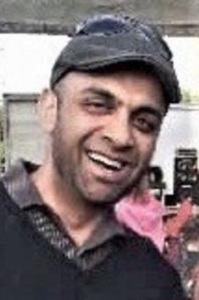
Suman Mallick’s debut novel The Black-Marketer’s Daughter was shortlisted for the Disquiet Open Borders Book Prize, and praised by the jury as a “complicated and compelling story” of our times.
Suman Mallick received his Master of Fine Arts from Portland State University, where he also taught in the English and Creative Writing departments.
Suman Mallick makes his home in Texas with his beloved daughter and dog. His homes away from home are Calcutta, India, and Portland, Oregon.
1) As a child did you have a dream job in mind?
Hi there, and thanks first of all for inviting me to this interview. Like a million other boys growing up in India, my dream was to be an all-rounder like the cricket gods of the time: Kapil Dev of India, Imran Khan of Pakistan, and Ian Botham of England; but at the same time somehow I also knew that my dream was nothing but a dream. My father was a chemical engineer and my mother taught chemistry, and any discussion on cricket inevitably turned into something like how much cork went into the making of a ball or the composition of its skin, or how to calculate the velocity or momentum or trajectory of it.
I guess what I’m trying to say is that the implicit expectation was that I’d head in the direction of science, and what remained to be seen was whether I’d sprint or run or walk or crawl. And to be honest, I didn’t mind that at the time; or perhaps it was that I just didn’t know any better.
2) Who was your favourite childhood author (s)?
I loved Satyajit Ray’s Feluda detective stories in Bengali, and the Sherlock Holmes children’s collection in English. Tagore, of course, because if you don’t read Tagore as a Bengali child, you get taken away from home and are sent to the zoo to live in the monkey cages (at least that’s what my grandfather told me.) My father had a thick volume of Chekov’s short stories, and I read them whenever my mother wasn’t looking. (Hell of a way to get in trouble, don’t you think?) But I did not really read a lot until I was thirteen or so. My focus was on going outside to play as much as I could, and my parents’ focus was on getting me proficient with the periodic table as soon as they could.
But that changed when I became a teenager. My maternal uncle and his wife (and their newborn baby boy) came to live with my mother and me for a while after my father passed away, and they were into literature and the theater. They had subscriptions to literary magazines that all of a sudden popped up all over the house. Between those magazines, and the steady stream of books that my English teacher started flooding me with, within a year I’d become an indiscriminate reader, especially of fiction, who no longer could imagine a life without it.
3) Was there a particular point in your life that you realised you wanted to be a writer?
You know, I had a poem (written in Bengali) published when I was in Grade 3 or 4 (I can’t remember), and in one sense I have been a writer most of my life. But until I engineered a 2-year hiatus from my day job and enrolled in the MFA program, writing was just a secret escape hatch from life. I made a living in science and engineering for a few years after college, and then in banking and finance after getting my MBA. But apart from a particularly nosy roommate and a handful of women who just had to know because of their proximity to my private life, even my friends and other family members have never known that I wrote, because I never discussed it. And even after my MFA, when I returned to my prior life and career, nobody except my daughter (and the writer friends I made while at the university) really knew what I’d been up to.
I guess I’ve never considered writing a profession; I still don’t, and I’m not sure that I’ll ever be a “writer” who writes full time and makes a living from it, although I certainly hope to someday have a lot more time to devote to it.
4) What is your average writing day like? Do you have any special routines, word count, etc?
I set aside two-hour blocks on weeknights after my daughter and our dog go to sleep and the house is finally quiet, and two two-hour blocks each on Saturdays and Sundays unless I’m traveling or have some other pressing obligation, for a total of 9 blocks per week; and at the end of the week, if I have actually been able to write, revise, or edit during at least six of those blocks, then I check that week off as having been a productive one. There’s always something going on, like this interview for example (which is important from a big-picture perspective), that demands a couple of hours and requires me to expend a block, but if I can do so by discussing writing or on something else writing-related, it’s always time well spent. I’ve learned over time not to fret over missed blocks.
Besides, so much of the work of writing, for me at least, gets done when I’m away from my desk, that the blocks of time are just for the discipline aspect of it. After completing my MFA, I moved to Austin and worked at a fledgling startup. The work was all-consuming and stressful on its own, but on top of that I fought almost an hour of traffic each way to get to and from work, my daughter hated moving back to Texas and had a difficult time adjusting to life in a new city and elementary school, and other events occurred within our extended family that caused us both a lot of anguish.
So after two years of reading and writing as much as I could while at the university, I suddenly entered a phase where there was no time to read or write. It had happened before too, when my daughter was a toddler and my wife was gravely ill. But this time around when I found myself without large blocks of time to write, I started a private blog and nicknamed it “A Sad Project,” the sad standing for a sentence a day. The goal was to write at least that one sentence, at the end of the day, to add to whichever piece I was working on at the time, and to make it count. But the really important thing was to think about that sentence throughout the day, whenever I could find even a minute’s calm amidst all the turbulence. And what I discovered was that more often than not, the mere process of concentrating on that one sentence inevitably led to thinking about what came before and after it, and that frequently yielded more than a sentence at the end of the evening. Sometimes I ended up writing a para, sometimes a page, even though my eyes were half shut and my brain half molten by the time I actually sat down to write, often around 10 at night after I’d worked for another hour or two after putting my daughter to bed.
I imagine it was no different than what a lot of other writers have to deal with to pursue this craft, and I know that it was certainly a hell of a lot easier than what someone like Solzhenitsyn, or Behrouz Boochani, for example, had to endure in order to write. So I try to make the best of whatever time that I can dedicate to writing, remain thankful for what I am able to produce on the page, and leave it at that and go on with my life.
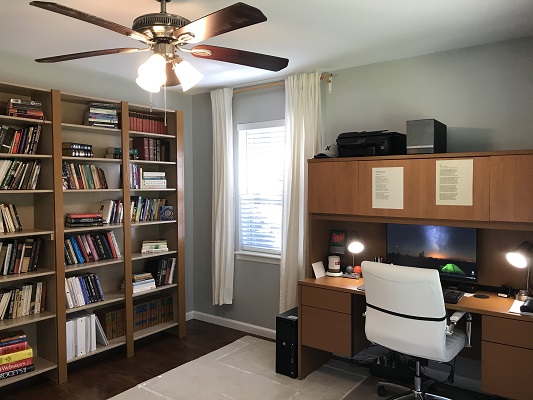
Where Suman Mallick Writes
5) How many books have you written? Any unpublished work?
Prior to my debut novel, and apart from poetry published as a child, I’ve only published a little of my work online under a pseudonym. Until enrolling in my MFA, I submitted nothing, which is a good thing and saved me a lot of rejection heartache because I now realize how technically inept all that stuff was.
I’ve written two novels and a bunch of stories (some novella length), a few poems here and there, some creative nonfiction and essays, scene sketches and one-act plays—whatever struck my fancy. During my MFA I wrote this novel, four short stories, and a full-length play that a wonderful mentor and professor in the Theater department directed for a staged reading. (I really need to get back to it one of these days.)
6) Are you a plotter or a pantser?
A bit of both. I like to have the large ideas underpinning a piece a bit flushed out in my head, so that I know and am comfortable with what I’m trying to accomplish by writing it. But once that score is settled inside my head, I often fly by the seat of my pants, especially when I’m tired or trying to squeeze out a particular scene in a mad dash against time, knowing that I can always come back to it later. I’ve learned the hard way what any writer will tell you: that revising a page filled with words is always easier than staring at a blank one.
Concerning your latest book:
Publisher – Atmosphere Press
Pages – 166
Release Date – 13th October 2020
ISBN 13 – 978-1648261541
Format – ebook, paperback

When Zuleikha arrives in Texas via arranged marriage from Pakistan, she soon realizes how different life in America is from the portrayals in the confiscated contraband books and movies her father trafficked in to pay for her education and dowry. Having trained as a pianist without ever owning a real piano, she finally has one—a wedding present from her husband. As Zuleikha learns to navigate her new role as a suburban middle-class housewife, she begins to feel diminished by her seemingly kind husband’s regular dismissal. She offers piano lessons to the neighborhood kids, and in doing so begins to find her identity and independence.
Everything changes when Patrick—the father of her young son’s friend—signs up for lessons himself. Zuleihka and Patrick grow closer, and Zuleihka finds herself in love for the first time. Zuleihka is caught between being a good Muslim wife and obedient daughter, and following her heart. Despite how careful she is, the affair is eventually discovered, leading to horrific violence with gruesome and fatal consequences. The ensuing circumstances catapult Zuleihka into the glare of the public eye in a foreign land, where she finds herself at the epicenter of a political firestorm fueled by winds of anti-Muslim hysteria, with different people seemingly using her situation to advance their own hidden agendas.
Amazon.co.uk – Amazon.com – Amazon.in – Apple Books – Blackwells
7) How did you go about researching the content for your book?
As you can imagine, writing a novel from the point of view of a Pakistani woman who is a pianist and lives in America, encounters domestic violence, runs afoul of the mosque, and ends up in a legal quagmire, took a lot of research, because I’m neither Pakistani, nor a woman, nor a pianist, nor a lawyer, nor have experience with domestic violence, nor a religious scholar.
I’ve thanked a few of the people who helped me with crucial research in the Acknowledgments page of the book, but really, the list is quite long, not just in terms of people (most of whom live and work anonymously and without fanfare), but also with regards to books, movies, videos, articles, and most importantly, experiences that helped me develop the themes that I explore in the book. Being a longtime volunteer with organizations that serve refugees, immigrants, entrepreneurs in developing countries that depend on microfinance, and cancer research, certainly gave me perspectives and ideas. One particular experience that was quite striking with regards to research for this book was watching an abortion procedure gone awry (don’t ask how I managed to do it, I just did).
But that research process, to me, yields one of the biggest rewards of the exercise of writing: the opportunity to learn life anew by pursuing something that’s challenging and compelling enough to force a writer to set aside what they do know and think and feel, and study, examine, and experience what they don’t. Toni Morrison once noted that if there’s a book you want to read but it hasn’t been written yet, then you must write it. Maya Angelou said something similar, that there is no greater agony than bearing an untold story inside you. I can relate to what those stalwarts meant in a visceral, almost physical way, in the sense that of all the other things I could have done with my time, writing this story (or anything else I’ve written) was what I had to do more than almost anything else in order to live.
8) How long did it take to go from ideas stage to writing the last word?
The novel was inspired by an unpublished short story of mine, which itself was inspired when Malala Yousafzai was shot in a school bus for being an activist for female education in 2012. But I only started writing the novel itself while enrolled in my MFA program at Portland State University, in the winter of 2015, and finished it by the summer of 2016. So this novel, most of which takes place in Texas (with backstory in Pakistan), was actually written in its entirety in Oregon.
9) How did you come up with the title of your book?
Ha! That’s a good one. I wrote the novel under a working title: “Apples and Knives.” (It has to do with backstory; you’ll get it if you read the book.) That title stayed atop my MFA thesis, and throughout the submission process. But both publishing houses that expressed interest in the work recommended that I change the title. Nick, my eventual publisher, even said that if for some reason he had to make only one change to the manuscript, he would replace the first three words, the title.
That set off a little existential crisis for me, because as you can imagine, this book had formed its own identity inside my head over the course of a few years, and I’d called it by this one name only. It’s a bit like if someone named their daughter Karen after a loving grandmother or aunt, and now, because the name is suddenly uncool because of being turned into a caricature and meme-fodder, it is suggested that they call their daughter something else.
Eventually I settled on the title “The Black-Marketer’s Daughter,” and Nick and Kyle (my editor) both liked it, but I still didn’t think readers would connect with the logic behind why I emphasized that aspect of the protagonist’s story than something else. But then the IndieReader reviewer noted right away what I tried to do there: highlight the ingrained precariousness of the protagonist’s circumstance by defining her relationship to a man. That made me happy and comfortable with the decision.
10) Can you give us an insight into your characters?
Sure. When Malala was shot, I found myself caring deeply for her, but just as much if not more about the untold stories of many other girls like her who suffer and sometimes die under very similar circumstances, but with nowhere near the same level of coverage or outrage. My initial short story was based on a girl like that; she was sharp but ultimately a bit hapless (as a pre-pubescent teen faced with a hopeless fate.) She tries to cope with her situation in a self-destructive way. But in the novel, that young girl has survived and she is grown up, married, and in the US.
I remember re-reading Coetzee’s Waiting for the Barbarians (one of my all-time most favorite books) after the short story was completed but while the novel was forming in my head, and Coetzee’s portrayal of the Barbarian girl certainly influenced my way of thinking about this grown-up character in the novel—her quiet, deeply grounded calm even when faced with strange circumstances, and her limitless capacity to cope with come what may.
11) What process did you go through to get your book published?
It’s been a long, slow journey. I started with the usual agent-querying process after completing my MFA and moving to Austin, and that takes time, as you know. The agents who expressed interest all ultimately passed, and they gave me three or four different reasons as to why they didn’t think they could pitch it to the big, New York based publishing houses. After a year of dancing that slow waltz, I started submitting to the small presses directly. Once the novel became a finalist for an award, there was a level of renewed interest, but I failed to really click with the first publishing house that liked the book, so I waited until my current publisher (Atmosphere Press) came along.
So from the start of the process until final acceptance, it took about three years, and then almost another year from then until now, when it is about to be released. Which, I know, is not that unusual for a debut, although I must admit there were times in between when I felt like giving up on the process altogether and just writing for myself like I always have.
12) What’s next for you writing wise?
We are in the middle of a pandemic, and a political and macroeconomic crisis, and what’s happening in the worlds of politics, economics, and the markets in general, has a direct bearing on my day job, and that keeps me very busy (I’d lie if I said I do not like the thrill, the challenges, and the responsibilities of it, nor am I going to say that I prefer writing over it any day, although on some days, I certainly would.) But at least I am not emotionally anguished like I have been in the past, and my daughter is a bit older and a lot more self-sufficient, so I am able to get some writing done as always despite being crazy busy.
I really do need to revise that play, but I’ve also been dusting off my old pieces, and revising and editing them with the intent of finally submitting them to literary magazines. And I’m always working on at least a couple of new stories, letting one take shape on paper while another one ferments in my brain. Who knows, maybe some of these stories will decide to gang up and form a collection one of these days.
Fun Questions
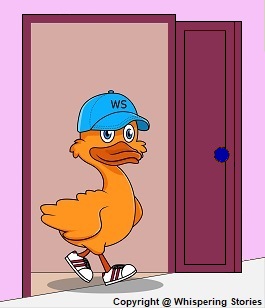
1) If you could have any super power for the day which would you choose?
I’ve never been into super heroes, nor have I ever wanted any super powers. I have, however, had a fascination with Nietzsche for some time now, and while reading this article recently (called Nietzsche’s Eternal Return, by Alex Ross, in the New Yorker), was again amazed by how Nietzsche’s use of the word über in the context of Übermensch, has influenced so many things, from the GBS play “Man and Superman” to the creation of the first Super-Man story to the naming of the company Uber, and how much Nietzsche’s ideas were used and abused not just by Nazis but by extremists of all stripes and hue, all in the name of being “super.” I’ll stop there.
2) Do you have any pets?
We have an absolute marvel: a half Black-lab, half Blue-heeler rescue dog named Chelsea. We adopted her in Austin a year after our last dog passed away in Portland. I could say she is super sweet and extremely smart, but doesn’t everyone say that about their dog? What she truly is, is a lifeline to me and my daughter. I only wish I got to do more of what she’s doing in the picture.
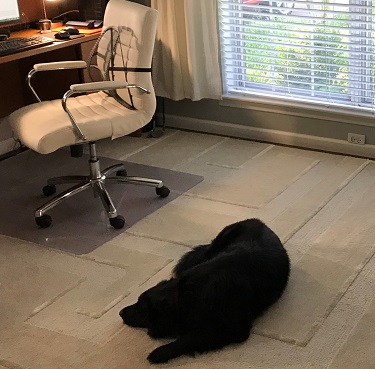
3) If you decided to write an autobiography of your life, what would you call it?
PhD: Parts highly Defective. It will have none of the lyrical magic of Speak, Memory. I am reading Luster (the debut novel by Raven Leilani) right now, and am mesmerized by how much hay she makes out of a character’s seemingly mundane struggle to pursue her craft while life, love, work get in the way, and by how raw she makes it. My memoir would have to be like that, raw, but real. And very true, because without that challenge, I could not make myself write it.
4) Your book has been made into a feature film and you’ve been offered a cameo role, which part would you choose, or what would you be doing?
I’m not an actor or a fan of the limelight, so I might stick to just writing the screenplay and then letting the professionals do their job. Although, now that I think about it, making a cameo as the protagonist’s father (in the flashback scenes) might be quite intriguing.
5) Where is your favourite holiday destination?
There are too many to note, so it seems somewhat trite to just name-drop an exotic place. I’ve been fortunate enough to travel a lot, for work and for pleasure, and often go through phases when I intensely miss being somewhere. Now that we are in the middle of summer here in Texas, I miss the less oppressive, greener and cooler climes of Oregon a lot; Portland, of course, and but also places like Newport, Sunriver, Salem, and the Mt. Hood areas that we visited a lot. We go back to Oregon once a year, but I don’t know how that’s possible this year. Portland has been in the news a lot lately on account of the protests, and the means being deployed to deal with those protests, so naturally it has also been on my mind a lot lately as well, especially with the book coming out.
6) A baseball cap wearing, talking duck casually wanders into your room, what is the first thing he says to you?
He says, The good news is that I saved your liver. I had to drink all your whiskey in order to do it, but I did it. And when you buy more whiskey, I’ll do it again, I promise. To save your liver and your life. But here’s the bad news: it killed my own liver, so that pâté you’re thinking about turning me into will be nothing but poison. So don’t even think about it, all right?
I would like to say a big thank you to Suman Mallick for sharing with us details of his writing life and for a wonderful interview.
Suman Mallick – Author links
![]()

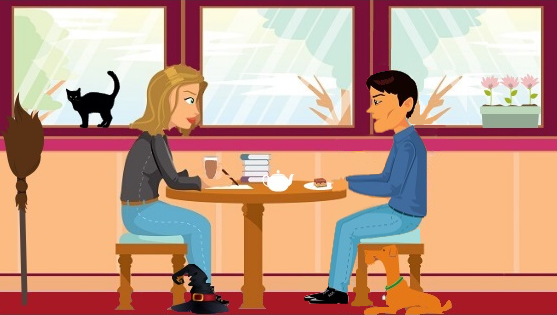
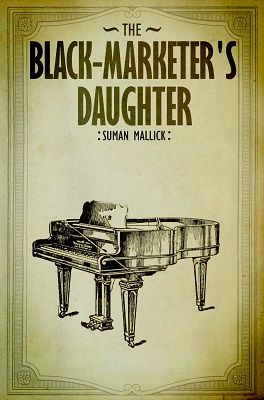




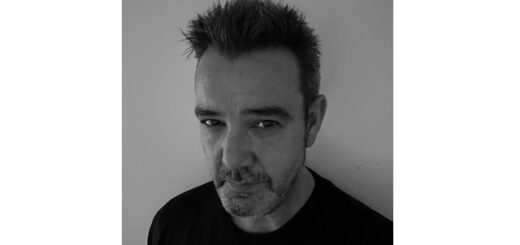
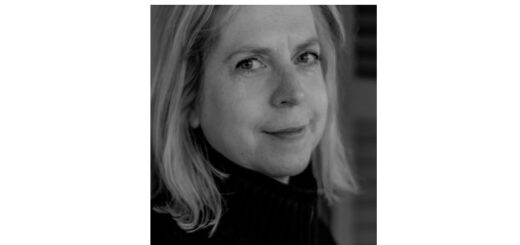
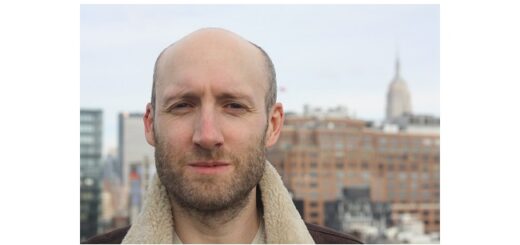


I wish my office was neat and organized like his…
This is new author to me. Thanks for sharing!
It is the first I am hearing of this author. Lovely interview.
New name for me. Excellent interview.
Great interview! I love your writing space (and writing buddy)!